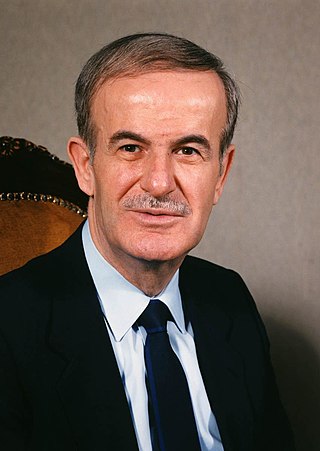
Hafiz al-Assad was a Syrian politician, military officer and revolutionary who served as the 18th president of Syria from 1971 until his death in 2000. He previously served as prime minister of Syria from 1970 to 1971, as well as regional secretary of the regional command of the Syrian regional branch of the Arab Socialist Ba'ath Party and secretary general of the National Command of the Ba'ath Party from 1970 to 2000. Hafiz al-Assad was a key participant in the 1963 Syrian coup d'état which brought the Syrian regional branch of the Arab Socialist Ba'ath Party to power in the country.

The Arab Socialist Baʿth Party was a political party founded in Syria by Mishel ʿAflaq, Ṣalāḥ al-Dīn al-Bīṭār, and associates of Zakī al-ʾArsūzī. The party espoused Baʿathism, which is an ideology mixing Arab nationalist, pan-Arab, Arab socialist, and anti-imperialist interests. Baʿthism calls for unification of the Arab world into a single state. Its motto, "Unity, Liberty, Socialism", refers to Arab unity, and freedom from non-Arab control and interference.
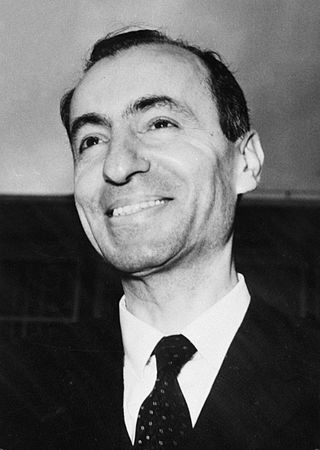
Michel Aflaq was a Syrian philosopher, sociologist and Arab nationalist. His ideas played a significant role in the development of Ba'athism and its political movement; he is considered by several Ba'athists to be the principal founder of Ba'athist thought. He published various books during his lifetime, the most notable being The Battle for One Destiny (1958) and The Struggle Against Distorting the Movement of Arab Revolution (1975).

Salah Jadid was a Syrian general, a leader of the left-wing of the Arab Socialist Ba'ath Party in Syria, and the country's de facto leader from 1966 until 1970, when he was ousted by Hafez al-Assad's Corrective Movement.

Zaki al-Arsuzi was a Syrian philosopher, philologist, sociologist, historian, and Arab nationalist. His ideas played a significant role in the development of Ba'athism and its political movement. He published several books during his lifetime, most notably The Genius of Arabic in its Tongue (1943).

Salah al-Din al-Bitar was a Syrian politician who co-founded the Arab Baʿth Party with Michel Aflaq in the early 1940s. As students in Paris in the early 1930s, the two formulated a doctrine that combined aspects of nationalism and socialism. Bitar later served as prime minister in several early Ba'athist governments in Syria but became alienated from the party as it grew more radical. In 1966 he fled the country, lived mostly in Europe and remained politically active until he was assassinated in Paris in 1980 by unidentified hitmen linked to the regime of Hafez al-Assad.
The National Progressive Front is a pro-government coalition of left-wing parties in Syria that supports the Arab nationalist and Arab socialist orientation of the government and accepts the "leading role" of the ruling Arab Socialist Ba’ath Party. The coalition was formed on the basis of the Popular Front model of Socialist Bloc, through which Syrian Ba'ath party governs the country by permitting nominal participation of smaller, satellite parties. The NPF is part of Ba'ath Party's efforts to expand its support base and neutralize prospects for any sustainable liberal or left-wing opposition, by instigating splits within independent leftist parties or repressing them.

Akram Al-Hourani, was a Syrian politician who played a prominent role during the democratic era of Syria in the 1950s, he established and led the Arab Socialist Party. He was a highly influential figure in the Syrian politics from the beginning of the 1940s until his departure into exile in 1963, during this period he was able to introduce significant reforms towards more just and fairer society especially in relation to the agricultural sector and land redistribution against the feudal system. Al-Hourani held various positions as a member of the Syrian parliament, the head of the parliament, minister of agriculture, minister of defence, and the vice-president of the United Arab Republic. He is the grandfather of Akram Al-Hourani, a lecturer and researcher in wireless network engineering and signal processing at RMIT University in Australia.

The 1966 Syrian coup d'état refers to events between 21 and 23 February during which the government of the Syrian Arab Republic was overthrown and replaced. The ruling National Command of the Arab Socialist Ba'ath Party were removed from power by a union of the party's Military Committee and the Regional Command, under the leadership of Salah Jadid.
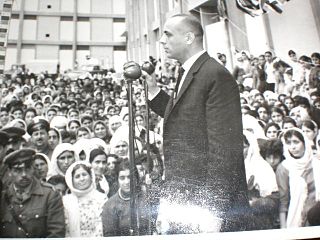
Nasim Al Safarjalani (1935–1994) comes from a prominent Arab Syrian family from Damascus, Syria. He is best known for being a governor of Latakia, and later was overthrown out of his post by the Ba'athist c'oup d'état of 1966.

The 1963 Syrian coup d'état, referred to by the Syrian government as the 8 March Revolution, was the seizure of power in Syria by the military committee of the Syrian Regional Branch of the Arab Socialist Ba'ath Party. The planning and the unfolding conspiracy of the Syrian Ba'athist operatives were prompted by the Ba'ath party's seizure of power in Iraq in February 1963.

The Corrective Movement, also referred to as the Corrective Revolution or 1970 coup, was a bloodless coup d'état led by General Hafez al-Assad on 13 November 1970 in Syria. Assad proclaimed to sustain and improve the "nationalist socialist line" of the state and the Ba'ath party. Ba'ath party adopted an ideological revision, absolving itself of Salah Jadid's doctrine of exporting revolutions. The new doctrine placed emphasis on defeating Israel, by developing Syrian military with the support of Soviet Union. Assad would rule Syria until his death in 2000, after which he was succeeded by his son Bashar al-Assad.
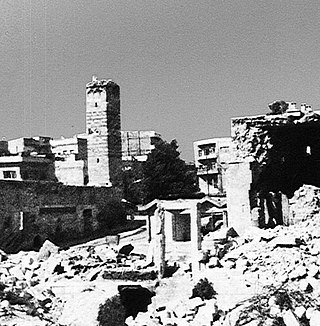
The Islamist uprising in Syria comprised a series of protests and armed revolts led by Sunni Islamists, mainly members of the Muslim Brotherhood, from 1976 until 1982. The uprising aimed to establish an Islamic Republic in Syria by overthrowing the Ba'athist government, in what has been described by Ba'ath Party as a "long campaign of terror".

The Arab Baʽath, also known as the Arab Baʽath Party, was an Arab nationalist political party founded in Syria by Zaki al-Arsuzi in 1940.

Munif al-Razzaz was a Jordanian-Syrian physician and politician who was the second, and last, Secretary General of the National Command of the Arab Socialist Ba'ath Party, having been elected to the post at the 8th National Congress held in April 1965.

Mansur al-Atrash was a Syrian politician and journalist. Together with fellow university students, Atrash became a founding member of the Ba'ath Party and its Syrian regional branch in 1947. During the presidency of Adib Shishakli (1951–54), he became an anti-government activist and was imprisoned twice, only to be released in an unsuccessful attempt by Shishakli to gain the support of Atrash's father, Sultan. In the year Shishakli was overthrown, Atrash was elected to parliament and turned down an offer to serve in Said al-Ghazzi's government. During the period of the United Arab Republic (1958–61), Atrash became a strong supporter of Egyptian president and pan-Arab leader Gamal Abdel Nasser. He opposed Syria's secession from the UAR and turned down offers to serve in successive separatist governments in protest.

Major General Muhammad Umran was a Syrian general and a founding member of the Military Committee of the unitary Ba'ath Party, and a leading personality in Syrian politics from the 8th of March Revolution until the 1966 Syrian coup d'état.
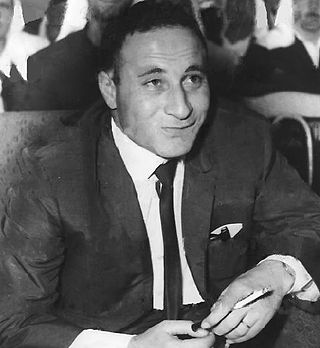
Abd al-Karim al-Jundi was a Syrian officer and a founding member of the Ba'ath Party's Military Committee which took over power in the country after the 1963 military coup. He also served as Minister of Agrarian Reform, and Director of the National Security Bureau.

This article details the history of the Arab Socialist Ba'ath Party from its founding in 1947 to its dissolution in the 1960s.

This article details the history of the Syrian Regional Branch of the Ba'ath Party.

















